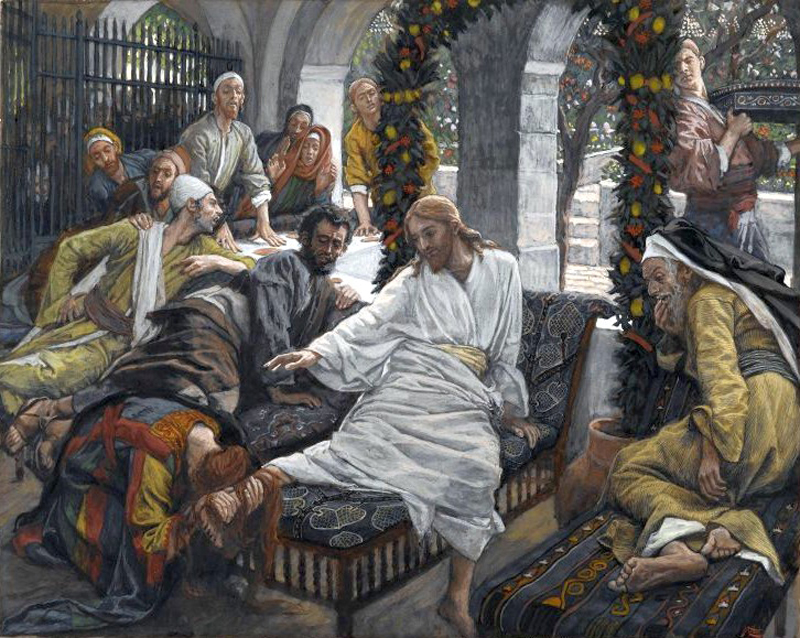
Anointing of Christ's Feet
James Tissot, ca. 1890
My dear friends,
Luke 7:36-50 offers a lesson for those walking the Christian and Bodhisattva paths, illuminating the difference between the mind of Christ—which embodies wisdom, compassion, and nonjudgmental love—and the mind of Simon the Pharisee, which reflects pride, attachment to external purity, and a lack of genuine compassion.
Open Heart vs. Judgmental Mind
Simon, though religiously observant, judges both Jesus and the woman who has come to bathe his feet in her tears, wipe them with her hair, and anoint them with costly ointment from an alabaster jar. Simon's heart is closed, bound by rigid concepts of sin and worthiness. In contrast, Christ sees beyond labels: He sees the woman’s sincerity, her suffering, and her capacity for love.
For spiritual seekers, this highlights the necessity of cultivating Bodhicitta, the "Awakening Mind" of love, compassion, and wisdom, which seeks to free all beings from suffering. Like Christ, a Bodhisattva does not look at past transgressions but at the present state of the heart, always encouraging growth and redemption.
Great Suffering Can Give Rise to Great Love
The woman’s deep repentance and love stem from recognizing the depth of her past misdeeds. Jesus teaches that one who has been forgiven much will love much: The woman, through her suffering, has been humbled and awakened to love.
Genuine Devotion vs. Superficial Righteousness
Simon fulfills external religious duties but lacks the inner warmth of devotion. The woman, though outwardly seen as sinful, embodies true faith through her selfless acts of washing Jesus’ feet, anointing him, and showing gratitude.
This mirrors the distinction in the Bodhisattva path between mere moral discipline and the wisdom of compassion. A Bodhisattva does not cling to external rules alone but engages in skillful means (upaya), meeting others with wisdom and love rather than judgment.
Liberation Through Faith and Love
Jesus tells the woman, “Your faith has saved you; go in peace.” Her transformation is complete—not because of external purification but because of her inner turning toward love.
On the Bodhisattva path, faith (śraddhā) is essential—not blind belief, but deep confidence in the path of awakening. Like the woman, those who recognize their suffering and dedicate themselves to transformation are truly liberated.
A Call to Seekers on the Path
- Do we resemble Simon, clinging to judgment and external righteousness?
- Or do we cultivate the mind of Christ, embracing all beings with love, compassion, and wisdom?
By meditating on these questions, we walk toward a heart like Christ’s—a heart vast as the Bodhisattva’s, embracing all beings in boundless love.